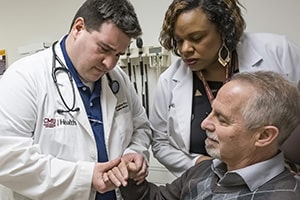Welcome to the CMU population health projects home page. Below you will find information regarding two population health studies aimed at improving the health of the Mid-Michigan community. Please read the information below to learn more about and participate
in Dr. Delicia Pruitt’s End of Life Care and Walk with a Doc projects.
End of Life - Dr. Delicia Pruitt

End-of-life discussions and preparations have been a behavioral health challenge for African American patients and their doctors.
Religious and cultural beliefs of the African American patient are often at odds with the physician's recommendations of end-of-life care. Poorly timed discussions during moments of critical care and lack of knowledge about end-of-life options result
in barriers and/or conflicts within the African American community.
This lack of knowledge and poor timing affects the whole family, including dying individuals and their children. Discussion of the end of life during a crisis makes it difficult to treat AA patients and decreases the wellness of the senior at the end
of life. We argue that end-of-life education must be initiated and completed when the patient is stable and with the involvement of the available family. This strategy will help to ensure that the senior understands their options, and their wishes are heard and documented.
If you are interested in participating in the project it will consist of a pre-survey, short educational video, and short post-educational video survey.
Participation criteria: African American, at least 30 years of age, do not have dementia.
Click the button below to partake in this project.
End of Life Education
Walk with a Doc - Dr. Delicia Pruitt
 Nearly 40% of the Saginaw County population is obese, which has contributed to heart disease being the number one cause of
death in the county. Obesity is also linked to other serious health problems such as diabetes, asthma, some cancers, poor mental health, and overall poorer quality of life. Increased physical activity may be able to help reduce BMI and help prevent
conditions associated with obesity.
Nearly 40% of the Saginaw County population is obese, which has contributed to heart disease being the number one cause of
death in the county. Obesity is also linked to other serious health problems such as diabetes, asthma, some cancers, poor mental health, and overall poorer quality of life. Increased physical activity may be able to help reduce BMI and help prevent
conditions associated with obesity.
In addition to helping achieve and/or maintain a healthy weight, physical activity has been shown to improve both physical and mental well-being. Activity at levels even lower than the recommended 150 minutes per week has been shown to have survival
benefits, as well as provide a lower mental health burden and protection against the development of depression in all age groups. Primary care intervention to increase physical activity has been shown to increase life years lived free from physical
disease.
The Walk with a Doc Program is a nationally recognized program that promotes physical activity in a group setting. In this program, a physician, or another medical professional, leads community members in a walking program to promote physical activity.
For this program, you will participate in a virtual physician-led 30-minute walk once a week for a period of three months. The aim of the program is to help motivate physical activity which may help lead to improved BMI, as well as increased energy
levels and confidence to be active.
Click below to fill out a short survey to begin your participation in this program.
Walk with a doc
 End-of-life discussions and preparations have been a behavioral health challenge for African American patients and their doctors.
Religious and cultural beliefs of the African American patient are often at odds with the physician's recommendations of end-of-life care. Poorly timed discussions during moments of critical care and lack of knowledge about end-of-life options result
in barriers and/or conflicts within the African American community.
End-of-life discussions and preparations have been a behavioral health challenge for African American patients and their doctors.
Religious and cultural beliefs of the African American patient are often at odds with the physician's recommendations of end-of-life care. Poorly timed discussions during moments of critical care and lack of knowledge about end-of-life options result
in barriers and/or conflicts within the African American community. Nearly 40% of the Saginaw County population is obese, which has contributed to heart disease being the number one cause of
death in the county. Obesity is also linked to other serious health problems such as diabetes, asthma, some cancers, poor mental health, and overall poorer quality of life. Increased physical activity may be able to help reduce BMI and help prevent
conditions associated with obesity.
Nearly 40% of the Saginaw County population is obese, which has contributed to heart disease being the number one cause of
death in the county. Obesity is also linked to other serious health problems such as diabetes, asthma, some cancers, poor mental health, and overall poorer quality of life. Increased physical activity may be able to help reduce BMI and help prevent
conditions associated with obesity.